needmust用法及练习完整版
[need的用法]can、may、must、need的用法
![[need的用法]can、may、must、need的用法](https://img.taocdn.com/s3/m/7c3e1b0ba200a6c30c22590102020740be1ecd3c.png)
[need的用法]can、may、must、need的用法篇一: can、may、must、need的用法can、may、must、need的用法can①表示能力,“能,会”。
[)Eg : Can you play basketball?②表示怀疑,猜测,常用于否定句或疑问句。
Eg :Li hua can’t be in the classroom.③表示请求,允许,多用于口语,译“可以”= may.Eg: you can go now.④can 开头的疑问句,肯定句,否定句用can或can’t.may①表示推测,“可能,也许”,用于肯定句。
Eg: He may come tomorrow.②表示请求,“许可,可以”。
Eg:May I borrow your book?注:表示请求,许可时,主语为第一人称的一般疑问句,否定回答用mustn’t“不可以,禁止,不许”,不用may not“可能不”。
③表示祝愿。
Eg :May you success.must①表示“必须,应该”。
②表示推测“一定”。
Eg:There is someone knocking at the door.It must be Jim.③否定句中,mustn’t 表示禁止,“不允许”。
④以must 开头的疑问句,肯定句回答用must,否定回答用needn’t , 表示“不需要,不必”=“don’t have to”.⑤表示“偏偏”。
Eg: Must you play the piano at this time.need①情态动词:+do,用need 提问或回答,肯定句回答用must ,否定句回答用needn’t.Eg: Y ou needn’t come to school so early.②实义动词:+to do ,用助动词提问和否定。
③+doing 表示被动。
④needn’t have done 表示没必要做某事但是做了。
(完整版)need,must用法及练习.doc

need 用法一.用作1. need sth.是 need 最常的用法之一,其后的可以是名,也可以是代。
如:1). The soup needs salt.2). They don need’t afraid any more.3). Does he need any help?2. need doing 与 need to be done通常物做主, need后面可跟名作,种情况下注意两点:①.主形式的名doing 具有被的含;②.名可以改其不定式的被形式而句子的意不。
例如:4). The door needs painting.=The door needs to be painted.5). Your car needs repairing.=Your car needs to be repaired.3. need to do sth.作, need后面需要接 to 的不定式 ,表示有或任去做某事。
如:6). What do we need to take for the party?7). Will we need to show our ID card?8). I need to take good care of my sister.二.用作情①.没有人称和数的化。
不主是第几人称,不主是数是复数,情都都无形式化;②.不能独充当。
情必与一个一起构成复合,并且个意要始是原形。
③.否定句只需在情之后加not。
9). You needn't do it again .10). He needn't worry about it .④.疑句只需将情提到主的前面。
例如:11). Need I type this letter again?12)—Need I stay here any longer?— No, you needn’ t.— Yes, you must.三.用作名need作名,含“缺乏,需要”;其复数表示“基本需要”。
英语中情态动词must,need,oughtto,hadbetter的用法
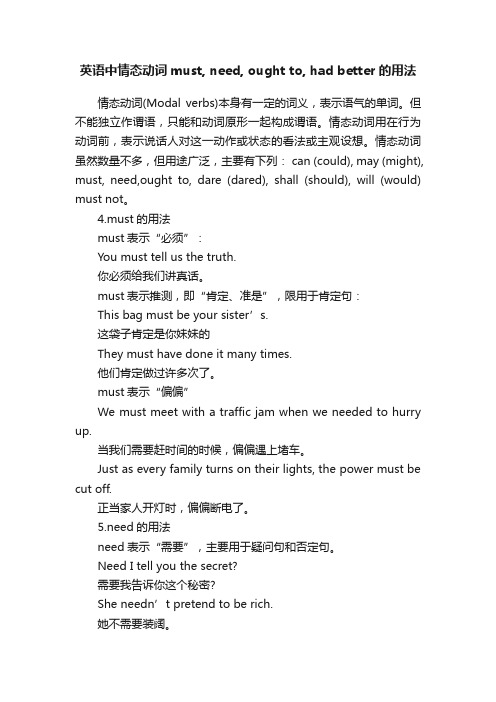
英语中情态动词must, need, ought to, had better的用法情态动词(Modal verbs)本身有一定的词义,表示语气的单词。
但不能独立作谓语,只能和动词原形一起构成谓语。
情态动词用在行为动词前,表示说话人对这一动作或状态的看法或主观设想。
情态动词虽然数量不多,但用途广泛,主要有下列: can (could), may (might), must, need,ought to, dare (dared), shall (should), will (would) must not。
4.must的用法must表示“必须”:You must tell us the truth.你必须给我们讲真话。
must表示推测,即“肯定、准是”,限用于肯定句:This bag must be your sister’s.这袋子肯定是你妹妹的They must have done it many times.他们肯定做过许多次了。
must表示“偏偏”We must meet with a traffic jam when we needed to hurry up.当我们需要赶时间的时候,偏偏遇上堵车。
Just as every family turns on their lights, the power must be cut off.正当家人开灯时,偏偏断电了。
5.need的用法need表示“需要”,主要用于疑问句和否定句。
Need I tell you the secret?需要我告诉你这个秘密?She needn’t pretend to be rich.她不需要装阔。
You needn’t advance the date.你们不需要把日期提前。
注意:need也常用作实义动词。
例如:Does he need to tell lies?他需要撒谎吗?6.ought to的用法ought to表示“应该”,语气比should稍重一些:You are a grown-up now, you ought to know how to take care of yourself.你已是大人了,应该知道如何照料自己了。
must need的用法
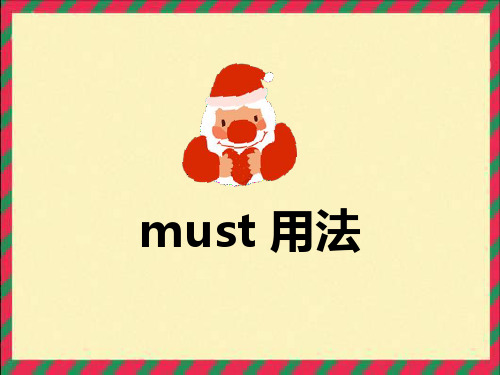
facts.
need的用法
★needn’t+不定完成式表示过去本来 不必做某事却做了 做过了 书P203
didn’t need to与needn’t have done的区别
●I didn’t need to go the station. (表示因为没有必要而不曾前往 没有去) ●I needn’t have gone to the station. (表示本无必要却在过去某时去了车站 去过了)
—Yes,you need.
—No,you needn’t /don’t have to /don’t need to.
need的用法
need的用法
做情态动词 need do
(无时态,人称及与语态的变化,一般用于否定句、 疑问句或条件句,也可用于whether或if之后, 或与hardly,no,never,scarely等否定意味 的词连用)需要,必须
must 用法
must的用法
表义务“必须”
(表示说话人的的主观意志,并根据法规、 道德、习俗等规定的义务、责任,以及做 某事的必要性等,来建议、劝告、命令、 强制某人)必须做
书P195
must的用法
表示将来的“必须”,常用半助动词 have to的一定形式(will/shall have to)
need的用法
做实义动词 need to do
(有人称,时态和数的变化,句式不 限)需要,必要
The meeting’s been cancelled. Ann ——all that work. 1995
A.need to do B.need have
must的用法总结及例句

must的用法总结及例句Must这个词,真的是个小宝贝儿,超级实用,生活中几乎随时随地都能用到。
先别急,咱们慢慢来聊聊。
想象一下,你和朋友在一起,讨论去哪里吃饭,突然有个朋友说:“我们必须去那家新开的餐厅!”这时候,must就是那种迫不及待的感觉,简直就像是你嘴里正嚼着一口美味的汉堡,眼里闪着光。
必须得去,就是这么简单!说到这里,你会发现,must并不只是个简单的词,它背后可是有故事的。
再说说规则。
用must表示义务的时候,感觉就像在给自己贴上了一张标签,提醒自己要做点什么。
有时候你在工作上,老板丢给你一堆任务,心里想着:“我必须完成这些!”那种心情就像是捡到了个大红包,喜忧参半。
嘴上可能不说,心里却在默默咕哝:“哎呀,我真得加油了!”这个时候,must就变成了一个催促器,迫使你动起来。
你还记得小时候老师说的那些话吗?“你必须认真听课!”虽然当时觉得烦,但长大了才知道,那真的是个好建议。
must在这里就像是个神奇的咒语,让你从懒惰中振作起来,开始努力。
must也可以用来表示强烈的建议。
比如,有个朋友最近感情不顺,你可能会跟他说:“你必须试着放下过去!”这种时候,must就带着关心的色彩,像是朋友间的一句忠告,暖暖的。
听到这句话,可能会让他心里一亮,似乎看到了一丝曙光,心里想着:“对呀,我必须朝前看。
”这就是must的魔力,总是能在关键时刻说出心里话。
再说到可能性。
用must的时候,有时候就是为了表达一种肯定的感觉。
比如,你走在街上,看到一个人急匆匆的样子,可能会心里想:“他必须是在赶时间!”这时的must就像是在推理,仿佛在说:“我有理由相信,他肯定是有事。
”有时候这些推测就像是侦探小说里的线索,让你忍不住想要探索更多。
生活中,must还常常伴随着情绪。
有时候你可能会听到人家感慨:“我必须得去旅行!”这句话可不是随便说说的,里面藏着的是对自由的渴望。
想象一下,那种心潮澎湃,仿佛已经看到了沙滩、阳光和海浪。
must的用法及练习
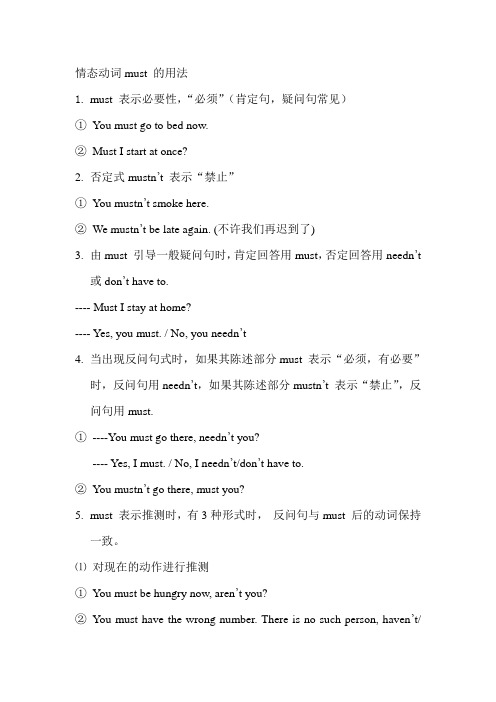
情态动词must 的用法1.must 表示必要性,“必须”(肯定句,疑问句常见)①You must go to bed now.②Must I start at once?2.否定式mustn’t 表示“禁止”①You mustn’t smoke here.②We mustn’t be late again. (不许我们再迟到了)3.由must 引导一般疑问句时,肯定回答用must,否定回答用needn’t或don’t have to.---- Must I stay at home?---- Yes, you must. / No, you needn’t4.当出现反问句式时,如果其陈述部分must 表示“必须,有必要”时,反问句用needn’t,如果其陈述部分mustn’t 表示“禁止”,反问句用must.①----You must go there, needn’t you?---- Yes, I must. / No, I needn’t/don’t have to.②You mustn’t go there, must you?5.must 表示推测时,有3种形式时,反问句与must 后的动词保持一致。
⑴对现在的动作进行推测①You must be hungry now, aren’t you?②You must have the wrong number. There is no such person, haven’t/don’t you?⑵对正在进行的动作进行推测He must be doing his homework, isn’t he?⑶对过去发生的动作进行推测①You must have read this book, haven’t you?②It must have snowed yesterday, didn’t you?6.must 用于反语,表示劝诫。
-----Must you make so much noise?(你非得吵这么大声吗?)-----Sorry, I’ll try not to.(2005全国Ⅲ卷)John, look at the time, __A__ you play the piano at such a later hour? A. must B. can C. may D. need7.与说话人的愿望相反,“偏偏,偏巧”。
情态动词can ,must,need的用法

A: , B: Sure.
! Can you
,please?
A : Thanks.Will you please
B : Sure. Help me with my maths Help me to do the exercises
?
go to play football with me take this ball
1.Must Li Lei go there by bus ?
2.How can he get there ?
A:Excuse me, can you tell me B: A:Must I B:
the way to hospital
A five-minute walk
the way to the cinema
thankswillyoupleasesurehelpmemymathsgoplayfootballhelpmemetakeball这种考风将使学校的学风每况愈下手机作弊是愈演愈烈我们平时的月考期中期末考试初中高中毕业考试等等这种考风将使学校的学风每况愈下手机作弊是愈演愈烈我们平时的月考期中期末考试初中高中毕业考试等等这种考风将使学校的学风每况愈下手机作弊是愈演愈烈我们平时的月考期中期末考试初中高中毕业考试等等learnnewwords
B:Sorry,I ______.
A:Who ___,do you know?
B:Our _______,I think.
Do exercises after the models Model(1):do your lessons, this evening, now
A:Can you do your lessons this evening? B:yes ,I can. A:Can you do your lessons now? B:No,I can’t 1)do your homework, this afternoon ,now 2)borrow books, from the school library, from the reading-room
外研版英语八年级上册Module11情态动词must,can,need用法专练
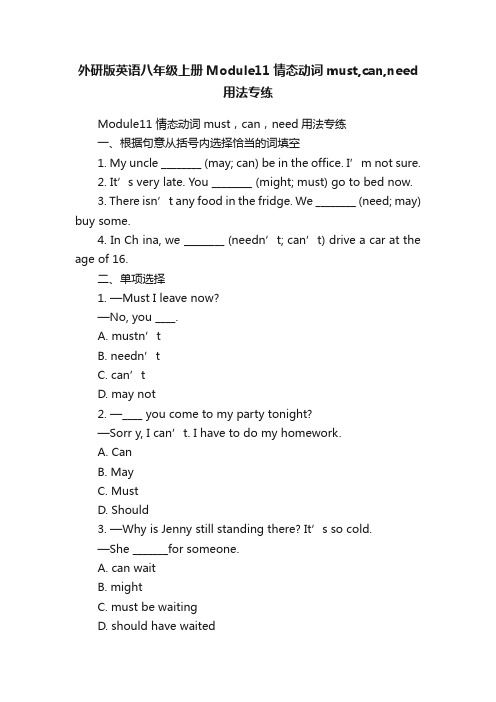
外研版英语八年级上册Module11情态动词must,can,need用法专练Module11 情态动词must,can,need用法专练一、根据句意从括号内选择恰当的词填空1. My uncle ________ (may; can) be in the office. I’m not sure.2. It’s very late. You ________ (might; must) go to bed now.3. There isn’t any food in the fridge. We ________ (need; may) buy some.4. In Ch ina, we ________ (needn’t; can’t) drive a car at the age of 16.二、单项选择1. —Must I leave now?—No, you ____.A. mustn’tB. needn’tC. can’tD. may not2. —____ you come to my party tonight?—Sorr y, I can’t. I have to do my homework.A. CanB. MayC. MustD. Should3. —Why is Jenny still standing there? It’s so cold.—She _______for someone.A. can waitB. mightC. must be waitingD. should have waited4. —Isn’t that Ann’s husband over there?—No, it ______be him. I’m sure he doesn’t wea r glasses.A. can’tB. must notC. won’tD. may not5. —Listen! Someone is knocking at the door. Who can it be? —It ______ be Tom. He said he would visit me this evening.A. can’tB. needC. mustD. mustn’t6. —Can I walk across the road now, mum?—No, you ________.You have to wait until the light turns green.A. couldn’tB. shouldn’tC. mustn’tD. needn’t7. —Dad, _____ I borrow your camera?—Sure. But why?A. canB. mustC. shouldD. need参考答案及解析一、1. may2. must3. need4. can’t二、1. B 考查Must I...结构的一般疑问句,否定答语要用“No, you needn’t.”。
情态动词canneedmust的用法
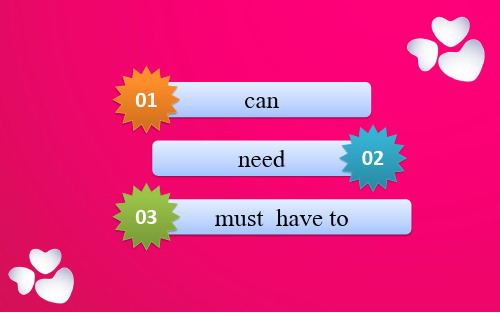
Need做情态动词表示需要 否定形式need not (needn’t) 比较常用,表示不
需要或不必要。
If she wants anything,she need only ask.如果她要 什么,说一下就行了。
• Yes, you must.是的,你必须在那之前到。 (表示一定要)
• No, you needn’t.不,你不必在那之前来。 (表示没必要,相当于you don’t need)
Can的用法
• Can 表示许可,可以,能够
• 否定形式是cannot(can’t) 表示不能,不可以,语气 弱于mustn’t.
• Yes, you must.是的,你必须报告。(表示必 须做)
• No, you needn’t.不,没必要。(表示没必要)
谢谢观看
01
ห้องสมุดไป่ตู้
can
need
02
03 must have to
Must 的用法
• must表示“必须,一定要”,可用于肯定句、否定 句和疑问句。
• 否定形式是must not (mustn’t) 表示“不能”,“禁 止”的意思。
must的一般疑问句的构成及其回答
• Must I come before 6:30 tomorrow?明天我必 须在六点半之前来吗?
You needn’t wait.你不必等待。 Need也可以作行为动词,表示需要常用于need
to do sth 结构。 I need to clean the house.我需要把房子打扫一下。
Need一般疑问句构成及其回答
need的用法及习题
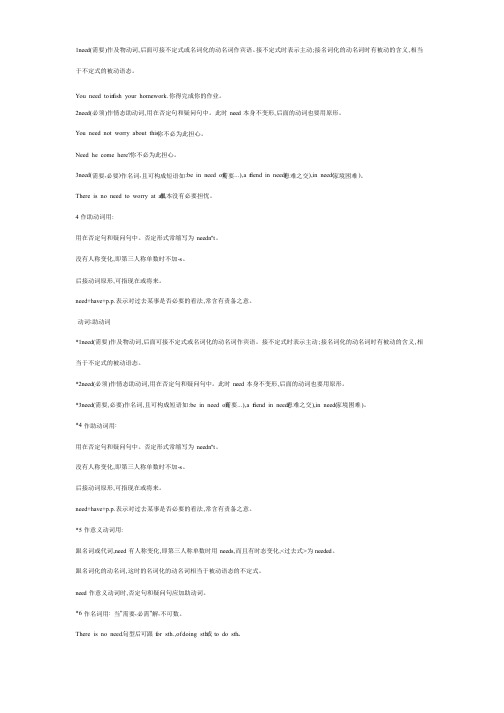
1need(需要)作及物动词,后面可接不定式或名词化的动名词作宾语。
接不定式时表示主动;接名词化的动名词时有被动的含义,相当于不定式的被动语态。
于不定式的被动语态。
You need to f inish your homework. 你得完成你的作业。
你得完成你的作业。
2need(必须)作情态助动词,用在否定句和疑问句中。
此时need本身不变形,后面的动词也要用原形。
后面的动词也要用原形。
You need not worry about this. 你不必为此担心。
你不必为此担心。
Need he come here? 你不必为此担心。
你不必为此担心。
你不必为此担心。
riend in need(患难之交),in need(家境困难3need(需要,必要)作名词,且可构成短语如:be in need of(需要...),a f r iend in need(家境困难)。
There is no need to worry at all. 根本没有必要担忧。
根本没有必要担忧。
4作助动词用: 用在否定句和疑问句中。
否定形式常缩写为needn''t。
没有人称变化,即第三人称单数时不加-s。
可指现在或将来。
后接动词原形,可指现在或将来。
need+have+p.p.表示对过去某事是否必要的看法,常含有责备之意。
常含有责备之意。
助动词动词;助动词*1need(需要)作及物动词,后面可接不定式或名词化的动名词作宾语。
接不定式时表示主动;接名词化的动名词时有被动的含义,相当于不定式的被动语态。
当于不定式的被动语态。
*2need(必须)作情态助动词,用在否定句和疑问句中。
此时need本身不变形,后面的动词也要用原形。
后面的动词也要用原形。
riend in need(患难之交),in need(家境困难*3need(需要,必要)作名词,且可构成短语如:be in need of(需要...),a f r iend in need(家境困难)。
must的用法及练习

情态动词must 的用法1.must 表示必要性,“必须”(肯定句,疑问句常见)①You must go to bed now.②Must I start at once?2.否定式mustn’t 表示“禁止”①You mustn’t smoke here.②We mustn’t be late again. (不许我们再迟到了)3.由must 引导一般疑问句时,肯定回答用must,否定回答用needn’t或don’t have to.---- Must I stay at home?---- Yes, you must. / No, you needn’t4.当出现反问句式时,如果其陈述部分must 表示“必须,有必要”时,反问句用needn’t,如果其陈述部分mustn’t 表示“禁止”,反问句用must.①----You must go there, needn’t you?---- Yes, I must. / No, I needn’t/don’t have to.②You mustn’t go there, must you?5.must 表示推测时,有3种形式时,反问句与must 后的动词保持一致。
⑴对现在的动作进行推测①You must be hungry now, aren’t you?②You must have the wrong number. There is no such person, haven’t/don’t you?⑵对正在进行的动作进行推测He must be doing his homework, isn’t he?⑶对过去发生的动作进行推测①You must have read this book, haven’t you?②It must have snowed yesterday, didn’t you?6.must 用于反语,表示劝诫。
-----Must you make so much noise?(你非得吵这么大声吗?)-----Sorry, I’ll try not to.(2005全国Ⅲ卷)John, look at the time, __A__ you play the piano at such a later hour? A. must B. can C. may D. need7.与说话人的愿望相反,“偏偏,偏巧”。
- 1、下载文档前请自行甄别文档内容的完整性,平台不提供额外的编辑、内容补充、找答案等附加服务。
- 2、"仅部分预览"的文档,不可在线预览部分如存在完整性等问题,可反馈申请退款(可完整预览的文档不适用该条件!)。
- 3、如文档侵犯您的权益,请联系客服反馈,我们会尽快为您处理(人工客服工作时间:9:00-18:30)。
n e e d m u s t用法及练习集团标准化办公室:[VV986T-J682P28-JP266L8-68PNN]need用法一.用作实义动词1.need sth.这是need最常见的用法之一,其后的宾语可以是名词,也可以是代词。
如:1). The soup need s salt.2). They don’t need afraid any more.3). Does he need any help2.need doing 与 need to be done通常物做主语,need后面可跟动名词作宾语,这种情况下应注意两点:①.主动形式的动名词doing具有被动的含义;②.该动名词可以改为其动词不定式的被动形式而句子的意义不变。
例如:4). The door needs painting.= The door needs to be painted.5). Your car needs repairing.= Your car needs to be repaired.3.need to do sth.作为实义动词,need后面需要接带to的动词不定式,表示有义务或责任去做某事。
如:6). What do we need to take for the party7). Will we need to show our ID card8). I need to take good care of my sister.二.用作情态动词①.没有人称和数的变化。
不论主语是第几人称,不论主语是单数还是复数,情态都词都无形式变化;②.不能单独充当谓语。
情态动词必须与一个实义动词一起构成复合谓语,并且这个实意动词要始终是动词原形。
③.变为否定句时只需在情态动词之后加not。
9).You needn't do it again.10).He needn't worry about it.④.变为疑问句时只需将情态动词提到主语的前面。
例如:11). Need I type this letter again12)—Need I stay here any longer—No, you needn’t.—Yes, you must.三.用作名词need作为名词,含义为“缺乏,需要”;其复数表示“基本需要”。
要掌握两个词组:in (great) need of(急需)与meet the needs of(满足……的需要)。
例如:13). There’s no need for you to try again.14). The factory is in great need of funds.“need+have+done”表示本来需要做某事而没有做。
“needn't+have+done”则表示“本来不需要做某事而做了”。
I needn't have bought so much wine—only five people came.He need have hurried to the station. In that case, be wouldn't have missed the train. you need not have said that“should+have+done”意思是“本来应该做某事,而实际没做。
” “shouldn't+have+done”表示本来不应该做某事,而实际做了。
含有指责对方或自责的含意。
1. Tom, you are too lazy. The work should have been finished yesterday.2. Look, Tom is crying. I shouldn't have been so harsh on him.3 you should have told me“must+have+done”表示对过去事情的肯定推测,译成“一定做过某事”,该结构只用于肯定句。
1. It must have rained last night, for the ground is wet.2. You must have been mad to speak to the servant.must的用法表示“必须”、“应该”。
例如:①We must protect our environment.②Everyone must obey the rule.2. must的否定形式must not表示“不应该”、“禁止”、“不准”。
语气比较强烈。
例如:①You mustn’t speak like that.②You mustn’t be late for school.3.在回答must的问句时,肯定形式用must来回答,但否定形式用needn’t 或don’t have to来回答。
而不用mustn’t来回答。
例如:①——Must I be home before 8 o’clock(8点之前我必须回家吗)——Yes, you must. No, you needn’t./No, you don’t have to.(是,你必须。
)(不,你不必。
)还可表示推测,意思是“一定”、“必定”,一般只用于肯定句中。
分三种情况:1.)对于现在状态的推测,我们用:must +v.(状态动词或系动词),例如:①He must be at home.(他准在家里。
)②There must be some children in the room.(房间里准有些孩子。
)2.)对于现在动作的推测,我们用:must +be + doing(行为动词),例如:①They must be cleaning their room.(他们准是在打扫房间。
)②He must be watching TV.(他准是在看电视。
)3.)对于过去事实的推测,我们用:must +have +过去分词,例如:①It must have rained last night.(昨晚准是下雨了。
)②I didn’t hear the phone. I must have been asleep.(我没有听到电话,我准是睡着了。
)练习一.Choose the right answer.( ) 1. You________any help, do youA. don’t needB. needn’tC. needD. doesn’t need( ) 2. ---Must I stay at the office this afternoon ---No, you .A. don’tB. needn’tC. don’t needD. can’t( ) 3. Tom get up a little earlier tomorrow.A. needsB. needC. need toD. needs to( ) 4. Need the doctor ________ with you tonightA. stayingB. stayC. staysD. to stay( ) 5. Look! Your shirt is so dirty. It .A. need washingB. need to washC. needs washingD. need wash( ) 6. The supply can’t the demand.A. meet need ofB. meet the need ofC. meet the needs ofD. meet needs of( ).7. The hospital is blood.A. in great need ofB. on great need ofC. in great need withD. on great need with( ) 8. Your room is full of dust. It .A. need cleanB. need cleaningC. need to be cleanedD. needs to be cleaned( ) 9. David anything to drinkA. Need,…\B. Needs,…\C. Does…needD. Do…need( ) 10. You to the meeting tomorrow if you have something important to do.A. needn’t to comeB. don’t need comeC. don’t need comingD. needn’t come二.Fill in the blanks using have to, have got to, must, should, ought to, had better. _____________ not get down until the bus has stopped._____________ be encouraged to speak English after class.often _____________ wait a long time for a bus._____________ go and see Mary tomorrow, but I don’t think we will._____________ not miss my train.traveling, you _____________ take care of your health.some parts of the world, you _____________ boil the water before drinking it.you have a stomach pain, you _____________ drink hot weak tea._____________ not swim immediately after a heave meal._____________ not wake me up when you come in.三. Translate1.他需要好好睡上一晚上。
2.你需要理发了。
3.我需要你查一下英语字典。
4.你不必解释。
5.我想要知道我们是否要带睡袋。
6.我们不必在雨里站着。
7.他昨天其实是不必去那儿的。
8.你不必这么粗鲁。
9.你一定是在开玩笑吧。
10.她结婚时一定很年轻。
11.我的妹妹准是在看电视现在。
12.我本来不应该买这双鞋的。
13.我本来需要去杭州的今年3月份。
